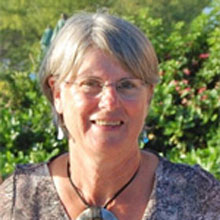
Eth Lloyd is the Director of AAPNZ, the Association of Administrative Professionals New Zealand
In an extraordinarily inspirational interview we talk to Director of AAPNZ, and personal development visionary, Eth Lloyd, about changes to the administrative profession since the 1960s, growing up in New Zealand, and the importance of professional development in your career.
Can we start with a little background information? Where are you from?
I was born in Wellington, New Zealand. My mother had to travel from the tiny and remote country area of French Pass to the capital city of Wellington by coastal steamer and climb up the side of the ship by rope ladder. At that time (1950) it was not considered safe for women to have their babies at French Pass so far from any medical help.
What is your background?
French Pass, where I grew up, was a very tiny village with only five families, a school, a shop and a community hall, and there was no road – we travelled by boat. We had no mains electricity so we had stand-alone electricity generators. When I was seven years old, the road came through from the nearest village, 70 kilometres away, and it wasn’t until I had grown up and left home that mains electricity arrived. I came from a family of five children, where I was the youngest. We had limited income, but we had a magnificent large and safe ‘playground’ that we lived in right by the sea. We had a very small local primary school, and when I started at five years old it had nine pupils and one teacher. I then went to a boarding school for my secondary schooling, 3 hours drive away – it was the only option.
How and why did you become an administrative professional?
Secretarial work was one of the few career options available to girls in the 1960s – secretarial, teaching, retail, hairdressing and nursing. Only a very few clever girls got to go to university. I moved to Wellington to do my secretarial training which I undertook at Wellington Polytechnic. I have worked in the secretarial field, now of course more commonly known as the administrative professional field, in one form or another since 1969. I have worked in New Zealand, United Kingdom, Bermuda and Australia.
You have worked tirelessly to establish a recognised career path for administrative professionals in New Zealand. Tell me why you got involved with this and what the result has been?
In the 1990s I worked at the Institute of Geological and Nuclear Sciences Ltd, and I had a wonderful manager, Dr Robin Falconer. He made it clear to me that he felt I had more potential than I was using. He also advised me that there must be a professional association for me and that I should join it, which I did in 1997. A little later, as I become more and more involved with the Association of Administrative Professionals New Zealand Inc (AAPNZ), he commented that surely there should be some formal recognition of the work that I and other administrative staff were doing, both at work and for the association we belonged to.
Those comments from Dr Falconer sparked my thinking and when I became AAPNZ’s National President (2002-2004) I had initial plans for an AAPNZ Certification (a form of registration for administrative professionals). AAPNZ Certification requires a formal qualification at L5 or above (equivalent to one year full-time tertiary study) plus three other criteria. During the two-year development process for the certification, I realised that while our AAPNZ members wanted this level of qualification to be required, many of them did not actually hold any formal qualifications at all, and so my thinking continued. In 2003, I presented a paper at the International Secretarial Summit in London titled Value ourselves so others value us, and from that evolved my passion for professional development and career pathways for administrative professionals. A lack of value of the person is often perceived in society through not holding a recognised qualification. This lack of value of the person can in turn lead to a lack of value of the work they undertake, and it not being regarded as a profession.
All this thinking led to the realisation that if I wished to make any higher level contribution to the professionalising of administrative work, I had to be able to quote the research on this portion of the workforce. Looking for this research resulted in the realisation that there was no research in New Zealand; therefore to be able to quote it, I would have to complete that research first!
So I guess the result of all of this is that AAPNZ now has a Certification process. There is now some academic research into the sector of the workforce currently known as Administrative Professionals, though I hear the title Secretary is making a come-back!
The above also led me to setting up my own business, Enderby Associates Ltd, in 2005, to work with administrative professionals to help and support them gaining their New Zealand national business administration qualifications while in the workplace. This is work that I have been undertaking for over six years now. It still fills me with immense pleasure to see someone who works in administration change from a person lacking self confidence to one who has pride in their work, and most importantly, in the skills and capabilities they have to do that work. This perhaps, is the most significant result for me personally from the journey I have taken over the last 10 years since I became AAPNZ National President in 2002.
You are one of only a few people in the world to have conducted a recognised academic thesis into the role of the administrative professional. How did this come about and what were the most interesting or surprising findings?
In 2004 I changed my work role from administrative professional to manager, and at this time, I also started at university to study for a Post Graduate Diploma in Education and Training for Professional Development. This was a huge challenge as I had largely failed at school, and had scraped through at Polytechnic, so did not have much regard for my own ability to study, to do academic work or in fact in my own capabilities at all. However, I soon discovered that academic work is actually about listening, reading, working hard and learning some new skills – but primarily how to research (something I managed but could still do much better, I must admit). I also learnt that I had valuable contributions to make using my own experiences in the workforce. Being able to contribute helped to build my confidence.
One of the most interesting findings in my research was similar to findings in research undertaken by Truss, Rosewarne, Alfes and Parr (2009), and also the International Association of Administration Professionals (USA) (2009). These findings demonstrated the variety of position or job titles under which administrative professionals work, and how few were called Secretary. In New Zealand, out of a sample of nearly 200 survey participants, nearly 50 different job titles were provided. Many of these titles were long, and were actually two titles put together, as organisations were restructured and people undertook combined roles where they previously had only one.
A real benefit was to understand that many administrative professionals wanted formal recognition of their skills, and wished to hold a formal qualification relevant to their work. However, many of them, while wanting this recognition, found there were many barriers to their being able to achieve these qualifications. Sadly, one of the most significant barriers was their own lack of value of themselves and their roles. Other barriers were faced in the workplace where their work environment did not believe that they, the administrative person, required professional development. In some cases, employers did not value any qualifications that had been achieved. However, it must be noted that in my research the majority of those who participated indicated that professional development was available for them, but accessing it could sometimes be difficult. This confirmed that most of the barriers to undertaking professional development were within the administrative professional themselves.
You have just been awarded a lifetime achievement award by the AAPNZ. Tell us a bit about the organisation and what winning this award means to you.
AAPNZ has been the professional body for administrative professionals in New Zealand for 40 years this year. It has undergone some name changes as it was formerly the New Zealand Society of Executive Secretaries Inc until 2000, when the current name was adopted. We have close to 500 members in 14 groups around New Zealand.
There have only been five Life Members of AAPNZ Inc, and sadly there are only four of those still with us today. The first was Doreen Smart who was the founder of New Zealand Certificated Secretaries Inc (the first name of AAPNZ), who died in 1998. Today we have our Doreen Smart Scholarship to mark her drive, passion and achievements. This scholarship is contestable and is available to any full member to assist them in achieving their own professional development goal. I was delighted to receive this scholarship in 2008 to help me with the costs of undertaking my Masters research for my thesis.
I was instrumental in developing AAPNZ Certification which was launched in 2004 and have been a significant driver for its continuing success. I have been a Director of our professional development company AAPNZ Professional Development Ltd since 2004 and on our Professional Development sub-committee since 2003, so as you can see, my contribution has been primarily focussed on professional development for administrative professionals. I have also been a member of the International Advisory Committee which supports the running of the International Office Professionals Summit every three to four years and have, since 2000, attended these summits in New Zealand, the United Kingdom, Australia, Trinidad and Tobago, and again back in New Zealand last year. I hope to attend in Papua New Guinea in 2014.
With the long history and contributions of the five Life Members before me; being recognised by AAPNZ as a whole for my contribution was amazing. I think my husband was even more overcome than I was, and frankly, I couldn’t have done what I did without his support so he was very deserving. However I believe that the Life Membership award means most to me for the recognition of the value of administrative professionals working towards both professional development goals and career pathways. These goals and pathways are often unclear, and the feelings of lack of value of self or the role significantly impacts on this lack of clarity. So for me, being made a Life Member was about all administrative professionals, not just me.
What inspires and motivates you?
I am now somewhat driven to be sure that there is a sound platform for others to take forward the dream of the administrative professional being recognised as a profession. I know that this isn’t something that I can achieve alone, and I am so encouraged now to have a group of people within AAPNZ who are picking up the baton and starting to run along with it.
Those who take this dream into the future may take it in different directions from my original thinking, but that isn’t important. What is important, is that there are drivers who will keep things moving to provide opportunities for administrative professionals to gain recognition of their skills, capabilities and expertise in their chosen career. That there are people who will support administrative professionals in their career pathway, be that staying within administration or branching off into other areas. The pathway itself isn’t important, what matters is, that the administrative professional has chosen for themself what that pathway is to be and takes responsibility for their own professional development opportunities to achieve it.
What has been the highlight of your career so far and why?
I believe I am especially privileged in that I have had two highlights. The first was doing well in my career as an administrative professional, which led me to undertaking the pathway I did, and therefore my academic achievement of a Masters degree, something I never believed was possible.
The second was my role, contribution and achievement of a Life Membership within AAPNZ. I did not aim to achieve a Life Membership; however the presentation of it so unexpectedly made the achievement of it all the more special and powerful for me.
What are the main challenges facing the profession at the moment?
I think there are several challenges, and these will vary according to where you live and our rapidly changing world.
There is the challenge of the international economic situation and its effects on the country you are living in. While New Zealand appears to have come through the economic crisis comparatively well so far, compared with some other countries, it has been at a cost of many administrative roles in government as the Government of the day tries to rationalise and cut costs. I am making no political statement with this, but the effects on those who have lost their employment are extremely difficult, and they are a group repeatedly targeted in restructuring.
There is the challenge of the rapidly changing business world. These changes are often technological, but are also in the expectations of the skills and knowledge you are required to ‘just have’ rather like you just know how to tie your shoe laces. Tying your shoe laces is something you were taught, but so long ago that it is seen as being ‘knowledge you just have’. For some workplaces, you are expected to ‘just have technological knowledge’, which can be quite stressful if do not have that knowledge yet. However, there do appear to be some skills in the use of technology (e.g. how a letter should look and read) that are often not being taught today. Again, there appears to be an assumption that you should just have that knowledge. The technological knowledge of software packages does not mean that you automatically know whether the end product is correct. This of course links back to valuing the skills of the administrative professional; if they were valued it would be accepted that this knowledge has to be learnt, that you do not ‘”just have it’.
There is the challenge of the length of your working life. By this I mean that for women, and this is a work force that is predominantly female, work no longer ceases permanently when you have children. Therefore, sorting out a career can be difficult as it may be broken into segments, and things may change if you are away from the workforce. Ensuring you have the skills to meet each of those segments can be challenging. There is also the common expectation that each person may have four or five different careers in their working life. Career change is something I support, however, ensuring you are well placed to capitalise on change may not have been the focus of an administrative professional due to family commitments. Ensuring your skills are valuable, useful and formally recognised, are factors that administrative professionals must individually take responsibility for. This personal responsibility for your professional development and career pathways has not been a feature of this sector of the workforce in the past, and gathering the information to help you is often not straight forward.
What advice would you give someone just starting in the role?
Wherever you are in the world seek formal recognition of the skills that you use in your day to day job, for example gain a relevant qualification. Be prepared to fund this yourself if you need to, it is for your benefit. Ensure you gather good foundation skills in administration; these skills are the basis of most roles in business. Learn everything you can from those around you in the workplace.
Recognition of your skills, preferably through a formal qualification, provides confidence in the competencies you have and some courage to either move on in your current profession or move out into new career pathways. This confidence may help you to take on higher level tasks, and to be recognised as having the capability to do more complex work.
Consider how it is with the new university graduate who comes into your workplace. They believe they know everything there is to know about everything. However when it comes to the ‘nuts and bolts’ of the tasks they have to do in the office, they often flounder. They have not been taught how to apply their university learning in the workplace. You, the administrative professional, often provide that knowledge to them, which surely indicates that your knowledge and skills are valuable.
While gaining your higher level education may be easiest when you are straight out of school, and do this if you can by going to university or a technical college, it is not always possible. If you have not had the opportunity at that time, remember there is nothing to stop you doing it at another time. Do not forget I started at university when I was 54 years old and graduated when I was 60. Age is not always a barrier, but whether you value yourself might be.
So what’s next for Eth Lloyd? Where do you want to be in 5 years’ time?
This is something I ask my all clients, and they all hate it as so often we don’t know where we want to be in five years time. What we are doing next year is enough of a challenge! As I have had such strong goals for so long, I am perhaps a little lost on this at this point.
However, my husband has retired now and we have four grandchildren – three who live overseas (currently in the United Kingdom) and one close by me here in Wellington, New Zealand. I suspect that my goal for the next five years is to let go and take steps towards retirement, so that both my husband and I can enjoy spending time with our grandchildren and with each other.
That does not mean I will stop being interested in the situation for administrative professionals. I will always be keen to be involved at some level, but perhaps it won’t be my sole focus, which it has been for so many years. Retiring is something we have to plan for isn’t it?”












